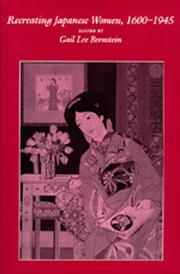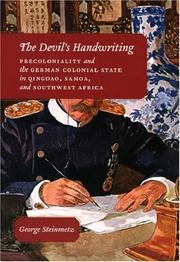| Listing 1 - 7 of 7 |
Sort by
|
Book
ISBN: 9024716365 9004286993 9789004286993 9789024716364 Year: 1974 Publisher: Brill
Abstract | Keywords | Export | Availability | Bookmark
 Loading...
Loading...Choose an application
- Reference Manager
- EndNote
- RefWorks (Direct export to RefWorks)
Indonesia
#SBIB:39A75 --- #SBIB:95G --- #SBIB:39A10 --- Etnografie: Azië --- Geschiedenis van Azië (inclusief Arabische wereld, Nabije Oosten) --- Antropologie: religie, riten, magie, hekserij --- Muslims --- Java (Indonesia) --- History. --- Politics and government. --- Mohammedans --- Moors (People) --- Moslems --- Muhammadans --- Musalmans --- Mussalmans --- Mussulmans --- Mussulmen --- Religious adherents --- Islam --- Djawa (Indonesia) --- Jawa (Indonesia) --- Pulau Jawa (Indonesia) --- Greater Sunda Islands --- Muslims. --- Indonesia --- indonesia
Book
ISBN: 0521010357 9781409433439 1409433439 9780521010351 1317048555 1315611260 1283223732 9786613223739 9781315611266 9781317048534 1317048547 Year: 1971 Publisher: Cambridge [England] Published for the Hakluyt Society at the University Press
Abstract | Keywords | Export | Availability | Bookmark
 Loading...
Loading...Choose an application
- Reference Manager
- EndNote
- RefWorks (Direct export to RefWorks)
#SBIB:95G --- 959.9 --- 959.9 Geschiedenis van de Filippijnen --- Geschiedenis van de Filippijnen --- Geschiedenis van Azië (inclusief Arabische wereld, Nabije Oosten) --- Philippines --- History --- Commonwealth of the Philippines --- Feilübin --- Filipinas --- Filippine --- Filippiny --- Firipin --- Philippine Islands --- Pilipinas --- Pʻillipʻin --- Republic of the Philippines --- Republika ng Pilipinas --- RP --- Филиппины --- フィリピン --- فلبين --- Filibbīn --- 菲律宾 --- Philippinen --- Description and travel. --- Social life and customs --- Description and travel

ISBN: 9786612771828 0520938690 1282771825 0520904036 9780520938694 9781429467421 1429467428 9780520904033 9781282771826 9780520244535 0520244532 9780520244542 0520244540 6612771828 Year: 2006 Publisher: Berkeley University of California Press
Abstract | Keywords | Export | Availability | Bookmark
 Loading...
Loading...Choose an application
- Reference Manager
- EndNote
- RefWorks (Direct export to RefWorks)
The Graves of Tarim narrates the movement of an old diaspora across the Indian Ocean over the past five hundred years. Ranging from Arabia to India and Southeast Asia, Engseng Ho explores the transcultural exchanges-in kinship and writing-that enabled Hadrami Yemeni descendants of the Muslim prophet Muhammad to become locals in each of the three regions yet remain cosmopolitans with vital connections across the ocean. At home throughout the Indian Ocean, diasporic Hadramis engaged European empires in surprising ways across its breadth, beyond the usual territorial confines of colonizer and colonized. A work of both anthropology and history, this book brilliantly demonstrates how the emerging fields of world history and transcultural studies are coming together to provide groundbreaking ways of studying religion, diaspora, and empire. Ho interprets biographies, family histories, chronicles, pilgrimage manuals and religious law as the unified literary output of a diaspora that hybridizes both texts and persons within a genealogy of Prophetic descent. By using anthropological concepts to read Islamic texts in Arabic and Malay, he demonstrates the existence of a hitherto unidentified canon of diasporic literature. His supple conceptual framework and innovative use of documentary and field evidence are elegantly combined to present a vision of this vital world region beyond the histories of trade and European empire.
SOCIAL SCIENCE / Anthropology / Cultural & Social. --- Tarīm (Yemen) --- Ḥaḍramawt (Yemen : Province) --- Muḥāfaẓat Ḥaḍramawt (Yemen) --- Hadhramaut (Yemen : Province) --- Hadramaut (Yemen : Province) --- Khadramaut (Yemen : Province) --- Ḥatsarmut (Yemen : Province) --- Governorate Number Five (Yemen) --- Fifth Governorate (Yemen) --- Al-Muḥāfaẓah al-Khāmisah (Yemen) --- Muḥāfaẓah al-Khāmisah (Yemen) --- Terīm (Yemen) --- Antiquities. --- Emigration and immigration --- History. --- #SBIB:39A75 --- #SBIB:95G --- Etnografie: Azië --- Geschiedenis van Azië (inclusief Arabische wereld, Nabije Oosten) --- anthropology. --- arabia. --- colonial rule. --- cultural anthropologists. --- diaspora studies. --- diaspora. --- diasporic literature. --- europe. --- family histories. --- genealogy. --- hadramis. --- historians. --- history and sociology. --- india. --- indian ocean. --- international relations. --- islam. --- islamic texts. --- literary studies. --- malay. --- migration. --- muhammad. --- muslims. --- nonfiction. --- postcolonialism. --- regional history. --- religious studies. --- southeast asia. --- textbooks. --- transcultural exchange. --- transcultural studies. --- world history. --- Hadramawt (Yemen : Province) --- Tarim (Yemen)

ISBN: 0520910184 1282355708 9786612355707 0585104905 9780520910188 9780585104904 0520070151 9780520070158 0520070178 9780520070172 9781282355705 Year: 1991 Publisher: Berkeley
Abstract | Keywords | Export | Availability | Bookmark
 Loading...
Loading...Choose an application
- Reference Manager
- EndNote
- RefWorks (Direct export to RefWorks)
In thirteen wide-ranging essays, scholars and students of Asian and women's studies will find a vivid exploration of how female roles and feminine identity have evolved over 350 years, from the Tokugawa era to the end of World War II. Starting from the premise that gender is not a biological given, but is socially constructed and culturally transmitted, the authors describe the forces of change in the construction of female gender and explore the gap between the ideal of womanhood and the reality of Japanese women's lives. Most of all, the contributors speak to the diversity that has characterized women's experience in Japan. This is an imaginative, pioneering work, offering an interdisciplinary approach that will encourage a reconsideration of the paradigms of women's history, hitherto rooted in the Western experience.
Women --- Feminism --- Employment --- History. --- #SBIB:316.346H20 --- #SBIB:39A11 --- #SBIB:39A75 --- #SBIB:95G --- J4176.80 --- J4353 --- Human females --- Wimmin --- Woman --- Womon --- Womyn --- Females --- Human beings --- Femininity --- History --- Employment&delete& --- Positie van de vrouw in de samenleving: algemeen --- Antropologie : socio-politieke structuren en relaties --- Etnografie: Azië --- Geschiedenis van Azië (inclusief Arabische wereld, Nabije Oosten) --- Japan: Sociology and anthropology -- gender roles, women, feminism -- history --- Japan: Economy and industry -- labor and employment -- women --- Femmes --- Féminisme --- Histoire --- Travail --- Japan --- Féminisme --- Japon --- agriculture. --- artisan. --- bakufu. --- class. --- division of labor. --- domesticity. --- femininity. --- feminism. --- gender hierarchy. --- gender roles. --- gender studies. --- gender. --- gendered labor. --- handicrafts. --- household chores. --- household labor. --- japan. --- japanese women. --- meiji restoration. --- merchants. --- misogyny. --- onnagata. --- onnarashisa. --- otokorashisa. --- patriarchy. --- peasants. --- post war. --- preindustrial society. --- samurai. --- sexuality. --- shingaku. --- status. --- tokugawa. --- wealth. --- womanhood. --- women and labor. --- women in history. --- women in the workforce. --- womens studies. --- womens work. --- working women.
Book
ISBN: 9789403183404 9403183403 Year: 2020 Publisher: Amsterdam De Bezige Bij
Abstract | Keywords | Export | Availability | Bookmark
 Loading...
Loading...Choose an application
- Reference Manager
- EndNote
- RefWorks (Direct export to RefWorks)
Vijf jaar lang werkte David Van Reybrouck aan zijn monumentale Revolusi. Hij interviewde bijna tweehonderd mensen, de laatste nog levende getuigen van de onafhankelijkheidsstrijd, in Indonesische rusthuizen, Japanse miljoenensteden en op verafgelegen eilanden. Ook in Nederland bracht zijn onderzoek tal van nieuwe verhalen aan het licht. De veelheid aan perspectieven en herinneringen weeft Van Reybrouck samen tot het aangrijpende verhaal van de Indonesische onafhankelijkheid. Zo toont hij hoe een nieuwe wereld vorm kreeg: in bloed, in pijn, met hoop.De onafhankelijkheidsstrijd van Indonesië, die zijn hoogtepunt bereikte in de jaren veertig van de vorige eeuw, is lang gezien als een conflict tussen kolonisator Nederland en het gekoloniseerde Indië. Maar in werkelijkheid was het wereldgeschiedenis. David Van Reybroucks Revolusi is het eerste boek dat de strijd lostrekt uit het nationale perspectief en het belang ervan toont als mondiale gebeurtenis. Indonesië was het eerste land dat na de Tweede Wereldoorlog zijn onafhankelijkheid uitriep. Na de Japanse bezetting verzetten jonge rebellen zich gewapenderhand tegen elke nieuwe vorm van overheersing. Britse, Australische en vooral Nederlandse troepen moesten rust en orde brengen, maar hun aanwezigheid leidde juist tot het ontvlammen van de eerste moderne dekolonisatieoorlog. Die strijd inspireerde onafhankelijkheidsbewegingen in Azië, Afrika en de Arabische wereld, zeker toen het vrije Indonesië in 1955 de legendarische Bandung-conferentie organiseerde, het eerste wereldcongres zonder het Westen. De wereld had zich met de Revolusi bemoeid en de wereld was erdoor veranderd. https://www.bol.com/nl/f/revolusi/9300000005461618/?country=BE
BPB9999 --- #SBIB: --- Nederlands-Indië --- Geschiedenis --- Indonesië --- Dekolonisatie --- Onafhankelijkheid --- Nederland --- Koloniale geschiedenis --- #SBIB:95G --- Geschiedenis van Azië (inclusief Arabische wereld, Nabije Oosten) --- History of Oceania with Australia --- anno 1940-1949 --- Indonesia --- BPB2101 --- onafhankelijkheidsoorlog --- válka za nezávislost --- uafhængighedskrig --- itsenäisyyssota --- nepriklausomybės karas --- guerra de independência --- πόλεμος ανεξαρτησίας --- vojna za neodvisnost --- gwerra ta’ indipendenza --- război de independență --- guerra de independencia --- guerre d'indépendance --- neatkarības cīņas --- Unabhängigkeitskrieg --- војна за независност --- vojna za nezávislosť --- iseseisvussõda --- függetlenségi háború --- рат за независност --- frihetskrig --- война за независимост --- wojna o niepodległość --- rat za nezavisnost --- luftë e pavarësisë --- war of independence --- guerra d'indipendenza --- národně-osvobozenecký boj --- boj za nezávislost --- vabadussõda --- nemzeti függetlenségi háború --- guerra de liberación nacional --- nemzeti szabadságharc --- Индонезија --- Ινδονησία --- Indonésie --- Indonezja --- Indonēzija --- Индонезия --- Indonesien --- Indonézia --- Indoneesia --- l-Indoneżja --- An Indinéis --- Indonésia --- Indonezija --- Indonezia --- Republika e Indonezisë --- Republika Indonezija --- Indonēzijas Republika --- Republiek Indonesië --- République d’Indonésie --- Δημοκρατία της Ινδονησίας --- Indonezijos Respublika --- Indoneesia Vabariik --- Indonesian tasavalta --- Republica Indonezia --- ir-Repubblika tal-Indoneżja --- Republic of Indonesia --- Republiken Indonesien --- Република Индонезия --- Repubblica d’Indonesia --- die Republik Indonesien --- Indonéská republika --- Indonézska republika --- Republika Indonezji --- Indonéz Köztársaság --- República da Indonésia --- Republikken Indonesien --- República de Indonesia --- Република Индонезија --- dekolonisatie --- kolonialisme --- History --- Politics and government --- 959 --- 959 Geschiedenis van Zuid-Oost-Azië --- Geschiedenis van Zuid-Oost-Azië --- Geneeskunde --- Techniek (wetenschap) --- Atlas --- Museum --- Kunst --- Autisme --- Cultuur --- Kind --- Samenleving --- Technologie --- Wetenschap --- Historische kritiek --- Vietnam --- Zuid-Afrika --- Kust --- Maatschappij --- Voorlichting --- Literatuur --- cogadh neamhspleáchais --- Indonesia - History - 1945 --- -Indonesia - Politics and government - 1950-1966. --- Indonesië
Book
ISBN: 0226703274 9780226703275 0226703290 1283637898 9780226703299 9781283637893 Year: 2012 Publisher: Chicago London
Abstract | Keywords | Export | Availability | Bookmark
 Loading...
Loading...Choose an application
- Reference Manager
- EndNote
- RefWorks (Direct export to RefWorks)
Historians of British colonial rule in India have noted both the place of military might and the imposition of new cultural categories in the making of Empire, but Bhavani Raman, in Document Raj, uncovers a lesser-known story of power: the power of bureaucracy. Drawing on extensive archival research in the files of the East India Company's administrative offices in Madras, she tells the story of a bureaucracy gone awry in a fever of documentation practices that grew ever more abstract-and the power, both economic and cultural, this created. In order to assert its legitimacy and value within the British Empire, the East India Company was diligent about record keeping. Raman shows, however, that the sheer volume of their document production allowed colonial managers to subtly but substantively manipulate records for their own ends, increasingly drawing the real and the recorded further apart. While this administrative sleight of hand increased the company's reach and power within the Empire, it also bolstered profoundly new orientations to language, writing, memory, and pedagogy for the officers and Indian subordinates involved. Immersed in a subterranean world of delinquent scribes, translators, village accountants, and entrepreneurial fixers, Document Raj maps the shifting boundaries of the legible and illegible, the legal and illegitimate, that would usher India into the modern world.
Accounting --- Bureaucracy --- Documentation --- Public administration --- Scribes --- Tamil language --- #SBIB:39A2 --- #SBIB:39A75 --- #SBIB:93H1 --- #SBIB:95G --- Information science --- Information services --- Library science --- Malabar language --- Dravidian languages --- Copyists --- Interorganizational relations --- Political science --- Organizational sociology --- Accountancy --- Business enterprises --- Commerce --- Commercial accounting --- Finance --- Financial accounting --- Business --- Bookkeeping --- Administration, Public --- Delivery of government services --- Government services, Delivery of --- Public management --- Public sector management --- Administrative law --- Decentralization in government --- Local government --- Public officers --- History --- Writing --- Antropologie: methoden en technieken --- Etnografie: Azië --- Geschiedwetenschap. Hulpwetenschappen van de geschiedenis --- Geschiedenis van Azië (inclusief Arabische wereld, Nabije Oosten) --- East India Company --- Governor and Company of Merchants of London, Trading into the East Indies --- United Company of Merchants of England, Trading to the East Indies --- English East India Company --- East India Company (English) --- East India Tea Company --- East-India Companie --- United East India Company --- Compagnie des Indes orientales d'Angleterre --- Compagnie unie de marchands d'Angleterre commerçans aux Indes orientales --- Tung Yin-tu kung ssu --- Honourable East-India Company --- Sharikat al-Hind al-Sharqīyah al-Barīṭānīyah --- Engelse Oost-Indische Maatschappy --- Kumpanī-i Hind-i Sharqī --- کمپنى هند شرقى --- English Company Trading to the East-Indies --- Records and correspondence --- Īsṭa Iṇḍiyā Kampanī

ISBN: 128196655X 0226772446 9786611966553 9780226772448 9780226772417 9780226772431 0226772411 0226772438 Year: 2007 Publisher: Chicago University of Chicago Press
Abstract | Keywords | Export | Availability | Bookmark
 Loading...
Loading...Choose an application
- Reference Manager
- EndNote
- RefWorks (Direct export to RefWorks)
Germany's overseas colonial empire was relatively short lived, lasting from 1884 to 1918. During this period, dramatically different policies were enacted in the colonies: in Southwest Africa, German troops carried out a brutal slaughter of the Herero people; in Samoa, authorities pursued a paternalistic defense of native culture; in Qingdao, China, policy veered between harsh racism and cultural exchange.Why did the same colonizing power act in such differing ways? In The Devil's Handwriting, George Steinmetz tackles this question through a brilliant cross
Imperialism. --- Colonialism --- Empires --- Expansion (United States politics) --- Neocolonialism --- Political science --- Anti-imperialist movements --- Caesarism --- Chauvinism and jingoism --- Militarism --- Germany --- Qingdao (China) --- China --- Samoa --- Namibia --- Independent State of Samoa --- Malo Saʻoloto Tutoʻatasi o Samoa --- Government of Samoa --- Malo o Samoa --- Western Samoa --- Cina --- Kinë --- Cathay --- Chinese National Government --- Chung-kuo kuo min cheng fu --- Republic of China (1912-1949) --- Kuo min cheng fu (China : 1912-1949) --- Chung-hua min kuo (1912-1949) --- Kina (China) --- National Government (1912-1949) --- China (Republic : 1912-1949) --- People's Republic of China --- Chinese People's Republic --- Chung-hua jen min kung ho kuo --- Central People's Government of Communist China --- Chung yang jen min cheng fu --- Chung-hua chung yang jen min kung ho kuo --- Central Government of the People's Republic of China --- Zhonghua Renmin Gongheguo --- Zhong hua ren min gong he guo --- Kitaĭskai︠a︡ Narodnai︠a︡ Respublika --- Činská lidová republika --- RRT --- Republik Rakjat Tiongkok --- KNR --- Kytaĭsʹka Narodna Respublika --- Jumhūriyat al-Ṣīn al-Shaʻbīyah --- RRC --- Kitaĭ --- Kínai Népköztársaság --- Chūka Jinmin Kyōwakoku --- Erets Sin --- Sin --- Sāthāranarat Prachāchon Čhīn --- P.R. China --- PR China --- Chung-kuo --- Zhongguo --- Zhonghuaminguo (1912-1949) --- Zhong guo --- Chine --- République Populaire de Chine --- República Popular China --- Catay --- VR China --- VRChina --- 中國 --- 中国 --- 中华人民共和国 --- Jhongguó --- Bu̇gu̇de Nayiramdaxu Dundadu Arad Ulus --- Bu̇gu̇de Nayiramdaqu Dumdadu Arad Ulus --- Bu̇gd Naĭramdakh Dundad Ard Uls --- Khi︠a︡tad --- Kitad --- Dumdadu Ulus --- Dumdad Uls --- Думдад Улс --- Kitajska --- China (Republic : 1949- ) --- Alemania --- Ashkenaz --- BRD --- Bu̇gd Naĭramdakh German Uls --- Bundesrepublik Deutschland --- Deutsches Reich --- Deutschland --- Doitsu --- Doitsu Renpō Kyōwakoku --- Federal Republic of Germany --- Federalʹna Respublika Nimechchyny --- FRN --- German Uls --- Germania --- Germanii︠a︡ --- Germanyah --- Gjermani --- Grossdeutsches Reich --- Jirmānīya --- KhBNGU --- Kholboony Bu̇gd Naĭramdakh German Uls --- Nimechchyna --- Repoblika Federalin'i Alemana --- República de Alemania --- República Federal de Alemania --- Republika Federal Alemmana --- Vācijā --- Veĭmarskai︠a︡ Respublika --- Weimar Republic --- Weimarer Republik --- ХБНГУ --- Германия --- جرمانيا --- ドイツ --- ドイツ連邦共和国 --- ドイツ レンポウ キョウワコク --- Germany (East) --- Germany (Territory under Allied occupation, 1945-1955) --- Germany (Territory under Allied occupation, 1945-1955 : British Zone) --- Germany (Territory under Allied occupation, 1945-1955 : French Zone) --- Germany (Territory under Allied occupation, 1945-1955 : Russian Zone) --- Germany (Territory under Allied occupation, 1945-1955 : U.S. Zone) --- Germany (West) --- Holy Roman Empire --- Colonies --- History. --- Foreign relations --- Race relations. --- History --- Imperialism --- #SBIB:39A73 --- #SBIB:39A75 --- #SBIB:95G --- #SBIB:96G --- S09/0503 --- Etnografie: Afrika --- Etnografie: Azië --- Geschiedenis van Azië (inclusief Arabische wereld, Nabije Oosten) --- Geschiedenis van Afrika --- China: Foreign relations and world politics--China and Germany --- PRC --- P.R.C. --- BNKhAU --- БНХАУ --- Deguo --- 德国 --- Gėrman --- Герман Улс --- colonialism, colonial, germany, qingdao, samoa, africa, regional, sociology, germanic, academic, scholarly, research, history, historical, textbook, educational, higher ed, college, university, classroom, professor, overseas, 1800s, empire, 1900s, herero, genocide, violence, native, indigenous, culture, cultural, race, racism, exchange, ethnography, discourse, namibia, tahiti, colony.
| Listing 1 - 7 of 7 |
Sort by
|

 Search
Search Feedback
Feedback About UniCat
About UniCat  Help
Help News
News